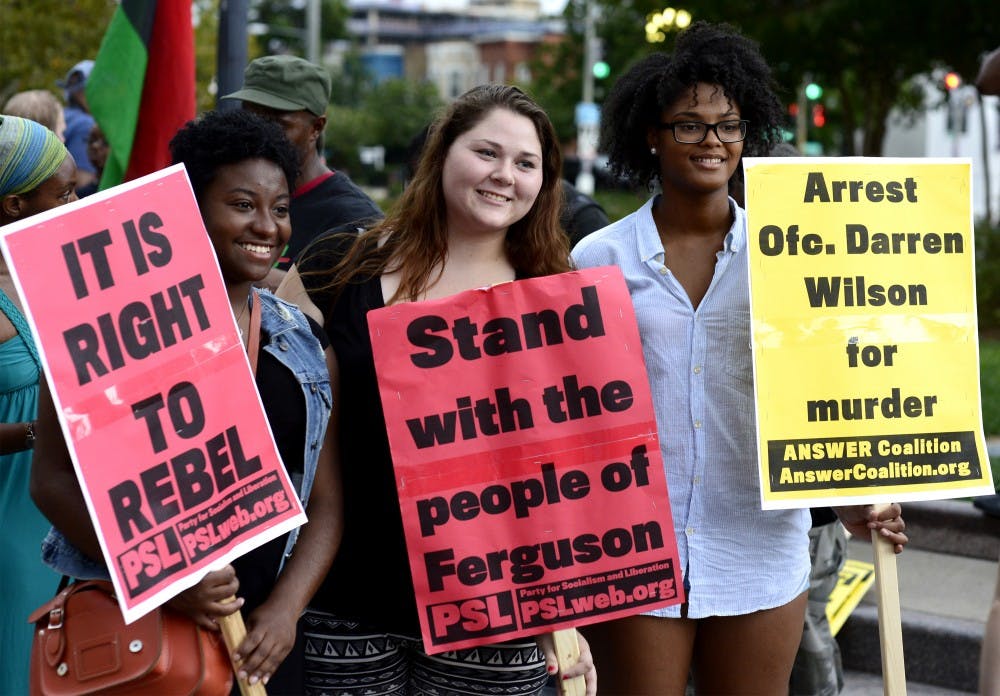Entrenched racism, the militarization of police forces and the mainstream media were just a few of the hot topic issues surrounding the death of Michael Brown that five AU professors and students discussed on Sept. 3.
Brown was a teenager from Ferguson, Missouri who was shot and killed by a police officer on Aug. 9. His death sparked widespread outrage and protests, as well as a national conversation about race in America.
The event was held in Kay Spiritual Center and was a part of the Table Talk series, which holds lectures and forums about contemporary ethical issues, and was sponsored by the Office of Campus Life.
Panelists Clarence Lusane of the School of International Service, Brian Forst of the School of Public Affairs, Washington College of Law professor Brenda V. Smith, professor John Watson of the School of Communication and Celine-Marie Pascale in the Department of Sociology spoke about the continuing racism and shared stories of former students who were in Ferguson.
Lusane, who has written extensively on issues concerning race and human rights, spoke about police oppression and called for increased political engagement.
“If ever there was a time to protest and speak out, it is now,” Lusane said. “If ever there was a time to challenge entrenched racism in police departments in far too many cities and towns, it is now. If ever there was a time for a new and radical reorganization of how policing is done in America, it is now.”
Forst added that police insensitivity and ethnic, racial, and class discrimination contribute community members distrusting law enforcement.
The events in Ferguson should not come as a surprise due to the U.S. history of racism and segregation, Pascale said. The segregation continues in the society today, even though “we may not call it that,” according to Pascale.
A former student of Watson’s witnessed this racism firsthand, he said. His former graduate student, journalist Alexia Fernandez Campbell of the National Journal, was in Ferguson covering demonstrations when police threatened to arrest her and a colleague. She frantically dialed Watson for help.
“Between huffing and puffing and blowing into her cellphone, she says, ‘I’m about to be arrested,’” Watson said at the forum.
Police were not allowing Campbell to reach a demonstration that was happening.
“I reviewed the Communication Law class I taught to her, and I reminded her about the First Amendment,” Watson said, “and I reminded her the first ethical directive in journalism is to get the story. And I did not advise her, but I told her: get arrested.”
Campbell and her colleague were not arrested, but she was not able to cover the story because the demonstration was dispersed by the time the police let her free, according to a Journal report.
After the panel a dozen students gathered downstairs around coffee and cookies and shared their own views and experiences. Some students mentioned friends and family the same age as Brown. Some are even fearful for their own loved ones.
“I have a brother who is African American and he is big, just like how Mike Brown was,” School of Communication junior Justice Mirzakhani said. “And he was actually stopped by police because they thought he was someone doing something wrong, when really he wasn’t. This is something I hold near and dear to my heart because it’s so relatable.”
For Ian Evans, a freshman in SPA, the forum gave him insights into the complex issues of race and economic status.
“I think conversations like this help us bridge cultural gaps,” he said. “I came from a community where we didn’t talk about race, and it’s my second week here and I’ve already had so much more stimulation [about racial issues] than I’ve ever had in my entire life.”
Students also expressed interest in continuing to discuss national racial issues on campus, with hopes that the University will help sustain the dialogue through similar forums and demonstrations. Many viewed the forum as a first step towards broader campus-wide engagement.
“Ferguson is a good launching point, but we need to address that this isn’t a one off incident,” said Samantha Storch, a senior in SOC.
The Center for Diversity and Inclusion has a series of workshops planned around issues of race, privilege and other topics that students have said matter to them, according to Fanta Aw, Assistant Vice President of Campus Life.
“We’re going to be looking at all of the different ways in which we can carry this conversation forward,” Aw said. “We want to have a sustained and structured conversation over time and not just one conversation. So we have committed to doing more.”





